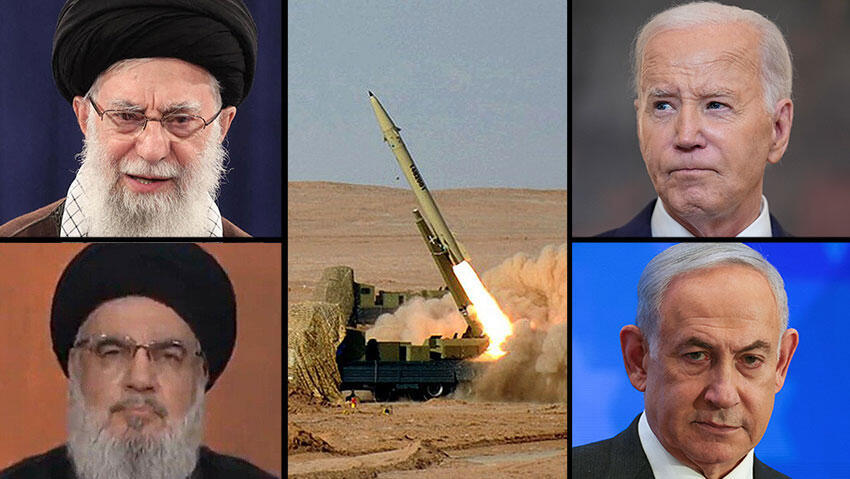Getting your Trinity Audio player ready...
Henry Kissinger famously remarked that "Israel has no foreign policy, only domestic policy," but right now, that statement seems to apply equally to the United States. For the Biden administration, U.S. foreign policy in the less than 100 days left before the election boils down to one goal: preventing a full-scale war in the Middle East, especially one that might involve American troops and exacerbate the sense of chaos that benefits Donald Trump and could lead to his reelection.
Beyond the immediate political calculations, preventing a regional war has been a primary focus for the Biden administration since October 7. The administration has largely given Israel free rein in Gaza while clearly concentrating on the broader threats posed by Iran and its proxies.
The U.S. has targeted proxy groups and issued particularly strong warnings to hostile actors in the region, from Hezbollah to the Houthis. Their highly publicized military movements in recent weeks are designed to keep the situation from spiraling out of control – a task that has become much more difficult even in the last two weeks.
In the longer term, the U.S. is working to strengthen its alliances in the Arab world, particularly with Saudi Arabia, Jordan and Qatar. While the Biden administration’s commitment to Israel’s defense remains unwavering, the president and his team have clearly lost patience with the Netanyahu government. They are deeply frustrated that a deal on the table – which could return hostages, lower tensions, and significantly strengthen U.S. and Israeli ties with Saudi Arabia – is repeatedly blocked for the same reasons that led Kissinger to make his famous statement.
As the election approaches, the tension in the U.S., already at unhealthy levels, will only increase. The last thing the Democrats need is for the Middle East to dominate the headlines again. Kamala Harris, the Democratic presidential nominee, made it clear at a campaign rally two days ago that she does not intend to let Gaza become a burden, as it was for Biden.
When pro-Palestinian protesters interrupted her speech at a massive rally in Detroit, she let them shout for a moment before saying, "If you want Trump to win, keep going. If not, I'm speaking now." While this may cause her some trouble with the left, the applause from the crowd suggested that most Democrats really do not want to hear more about the Middle East, and the Biden administration will do everything possible to ensure they don’t have to – at least until November 5.
Russia, in its own view, is a global power equal to the U.S. Its foreign policy is driven by this assumption and aims to diminish America’s influence, power and status worldwide, including in the Middle East.
The Russian invasion of Ukraine in February 2022 created unprecedented tension with Washington and many Western democracies, while also tightening Russia’s ties with China, Iran, and North Korea
– emphasizing security cooperation among these nations. This Russia-China-Iran-North Korea axis is united by the heavy sanctions imposed on each of them by the U.S. They all aim to reduce American dominance and shift the global order from a U.S.-led unipolar world to a multipolar one.
Russia’s policy toward Israel – against the backdrop of last week’s dramatic escalation and the risk of a full-scale war between Israel and Hezbollah, possibly involving direct Iranian participation – is closely tied to its broader interests in the region, but also to the war in Ukraine.
In recent weeks, Russia has increased its involvement in the developments surrounding Israel. It has deepened security cooperation with Tehran and, according to Western sources, has even supplied Iran with advanced electronic warfare systems and air defense systems, and may soon provide them with advanced Su-35 fighter jets. Palestinian Authority President Mahmoud Abbas was in Moscow this week to meet with Russian President Vladimir Putin – another sign of Russia’s attempt to assert its influence in the region.
Iran has been a significant ally for Russia in the Ukraine war, supplying thousands of drones, equipment and technological expertise. At the height of the tension between Israel, Iran and Hezbollah last week, Russian Security Council Secretary Sergei Shoigu, the former defense minister, visited Tehran. He met with his Iranian counterpart, Ali Akbar Ahmadian, as well as the new Iranian president, Masoud Pezeshkian, and the Iranian military chief, before departing after just a few hours.
According to Reuters, citing two Iranian sources, during the visit, Shoigu delivered a message from Putin to Iranian Supreme Leader Ali Khamenei, urging him to "respond with restraint against Israel" and advising him not to target Israeli civilians in the expected Iranian retaliation for the killing of Ismail Haniyeh in Tehran.
The ongoing war in Gaza and the north over the past ten months serves Russian interests. It has diverted U.S. and Western military attention and resources away from Ukraine and has exacerbated internal political divisions in Europe and the U.S. And Russia has even directly accused Washington of being responsible for the war, arguing that its failure to resolve the Israeli-Palestinian dispute has significantly contributed to the descent into war – a stance that resonates in the Arab and Muslim worlds.
Weakening U.S. power and influence, including in the Middle East, is a top priority for Moscow, and almost any means to achieve this goal is considered acceptable. Continued tension, and possibly an escalation to a full-scale war, could greatly serve Russia’s interests, strengthening its regional standing just as U.S. influence in the Middle East is steadily declining.



